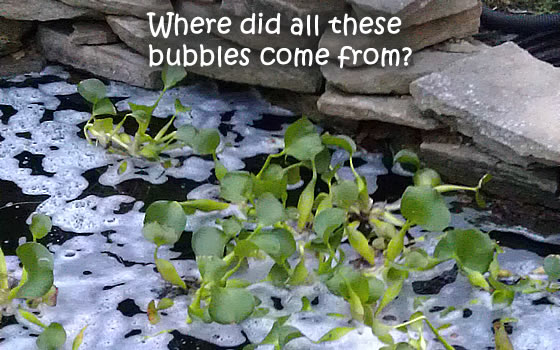
Garden Pond Protein Froth and Foam
Protein Froth is an unsightly foam which sits on the water surface and can look like some one has tipped washing up liquid in to your pond. Protein Foam is normally formed where the water comes back in to the pond at waterfalls and filter returns, but can also happen around fountains and venturi’s. In most cases it is caused by Protein, which is an oil based chemical that floats on the surface of the pond and makes the bulbs last longer. This oil is a natural chemical and will eventually disperse by itself, the problem is it will take months to do so and your pond can look awful until it goes. Not only is it ugly, but it can be dangerous to fish as well. The surface of the pond is where most of the essential gas exchange takes place, allowing Carbon Dioxide out and Oxygen in to the water, if the surface is then coated in protein oil it can hinder or even stop the gas exchange. So solving this problem not only to improve the appearance of your pond, but also ensures the health of your fish. Thankfully this is one of the simplest things to eradicate in your pond, TAP Anti Foam will literally make it disappear in front of your eyes.
Click here to go to our TAP Anti Foam Treatment Page
TAP Anti Foam is designed to breakdown the froth in garden ponds, created by the excessive build up of protein in the pond water. TAP Anti Foam is non toxic, harmless to plants, all fish and other aquatic life and does not affect bacterial filters.
Where did it come from?
It helps to understand why it has occurred in the first place, because in some cases it is preventable. The two most common causes for Protein Froth are spawning from fish/ frogs/toads and feeding the wrong type or quantity of food. Spawning is not something you have control over, but you can control the amount and kind of food you feed. If the fish are fed too much in one go, they will wolf it all down, but it will pass through them quickly and much of it comes out as waste including Protein. In the summer month’s food should not last for more than 5 minutes, any more and you will be overfeeding. If you are not convinced that the fish will get enough food this way stick to the 5 minute rule but feed them several times a day. To help you keep an eye on how much food the fish receive you can use a floating feeding ring, these float on the surface of the pond and keep the food in one place. In the cooler Spring/Autumn weather, fish are programmed not to absorb Protein, so feeding them a growth or high protein food at these times of year will mean it passes straight through them and comes out in to the water. Use the low protein wheatgerm foods at these times of year.
So the best way to prevent the protein foam from occurring is to feed your fish the correct kind of food for the time of year (and temperature) and to feed little and often.

